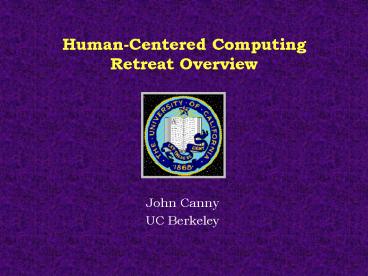Human-Centered Computing Retreat Overview PowerPoint PPT Presentation
1 / 13
Title: Human-Centered Computing Retreat Overview
1
Human-Centered ComputingRetreat Overview
- John Canny
- UC Berkeley
2
HCC
- Human-Centered Computing (HCC) is a research
effort at Berkeley that studies computing as an
ubiquitous technology which is transforming
society. - Its an interdisciplinary umbrella project
involving 30-40 faculty on campus.
3
HCC in a nutshell
- Computing is becoming ubiquitous, quiet, and more
tightly coupled with the physical world. - Computing in future will operate in human
contexts, rather than creating contexts which
humans must learn and understand. - HCC draws on the social sciences to build a deep
understanding of those contexts.
4
The problem of context
- Context is more than when and where an action
takes place. - It includes the activity, task, long-term goals,
and psychological state of people and groups of
people.
5
HCC is a two-way street
- Understanding social behavior is important for
computer applications that will assist people.
i.e. computer scientists gain from knowledge of
the social sciences. - Computing is permeating the daily lives of most
people. It has changed the nature of work, and is
changing the way people learn, buy goods and
recreate. It is both a transformative force and
an extraordinary tool for studies in the social
sciences. Social scientists benefit from seeing
emerging technologies up close, and in using
computational tools for large-scale studies.
6
HCC Overview
- Changes caused by information technology
- Creation of the knowledge worker and
informational companies. - The agile corporation temps, outsourcing,
offshore labor, retraining. - Ubiquitous networking and communication is
creating new kinds of social ties and reshaping
social networks. - The promise of education learner autonomy and
life-long learning. - HCC seeks to tie social and behavioral sciences
with information science and engineering.
7
Why now?
- Computing seems to be a great success
(credited for the relentless climb of the Dow). - BUT, the future success of information technology
depends on scaling barriers which are
increasingly non-technical.
8
Where the walls are
- Natural human-machine interaction.
- Computer literacy and life-long learning.
- Face-to-face vs. electronic interaction.
- Codified vs. tacit knowledge.
- Engineering vs. the social sciences.
9
HCC Overview
- HCC is not a single research project, but
provides an umbrella for interdisciplinary
projects across wall 5. - Some themes that youll hear about
- Natural interaction. Pens, gesture, speech.
- Design of learning tools, tools for learning
design. - Design as practice, tools for doing it.
- CMC tools based on the psychology of interaction.
- Mining tacit knowledge, social computer
networks.
10
Who we are
- From Sociology
- Barry Wellman (Toronto)
- Elisa Bienenstock (Stanford)
- Manuel Castells
- Claude Fischer
- From Computer Science
- John Canny
- Jerry Feldman
- David Forsyth
- Michael Jordan
- Anthony Joseph
- Randy Katz
- James Landay
- Jitendra Malik
- Robert Wilensky
- From GSE Graduate School of Education
- Andy diSessa
- Marcia Linn
- Michael Ranney
- From Electrical Engineering
- Ron Fearing
- Nelson Morgan
- Richard Newton
- Kris Pister
- Avideh Zakhor
- From Psychology
- Dacher Keltner
- Jerry Mendelsohn
11
HCC Faculty Researchers
- From Mechanical Engineering
- Alice Agogino
- Homi Kazerooni
- Paul Wright
- From SIMS School of information Management and
Systems - Marti Hearst
- Nancy Van House
- Hal Varian
- From Business
- Robert E Cole
- Jim Lincoln
- IEOR Industrial Engineering and Operations
Research - Ken Goldberg
12
Where it would be
- LAB space (2000 sq ft) in South Hall (SIMS), to
contain video editing eqpt., CMC tools, eqpt for
usability studies (head tracker etc.). - Centrally located on campus. Surrounded by other
small offices for temporary use.
13
Goals of the Retreat
- Survey the research at UCB (long-term views).
Introduce our industry participants. Think about
breakout group topics (today). - Sample some active research projects (talks and
posters). Brainstorm about the centers future.
How we should build it up, set priorities, make
connections (tomorrow). - Summarize the discussions and get feedback
(Friday).

